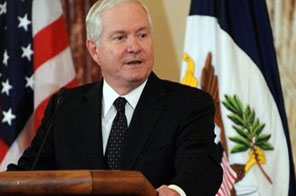US won't accept nuclear North Korea
SEOUL: U.S. Defense Secretary Robert Gates said Wednesday the United States will never accept a North Korea with atomic bombs, saying the communist regime poses threats "even more lethal and destabilizing" than before.
Gates arrived in Seoul on Wednesday for a two-day visit for annual defense ministers' talks with South Korea after a stop in Tokyo.
"There should be no mistaking that we do not today nor will we ever accept a North Korea with nuclear weapons," Gates told a group of American and South Korean troops at the U.S. military headquarters in central Seoul.
Gates said "the peril posed by the North Korean regime" has become "even more lethal and destabilizing."
He said the U.S. is firmly committed to providing South Korea with deterrence against those threats "with the full range of military might, from the nuclear umbrella to conventional strike and missile defense capabilities."
The U.S. keeps about 28,500 troops in South Korea to help defend the Asian ally against the North.
North Korea's nuclear and missile programs have long been a key source of security concern in the region.
Gates said the North's atomic program is a serious security challenge not only on the peninsula, "but for the region as a whole." He also called the impoverished regime a "serious proliferation threat."
"Everything they make, they seem to be willing to sell," he said.
The communist nation conducted nuclear tests twice first in 2006 and the second in May this year and is believed to have enough weapons grade plutonium for at least half a dozen atomic bombs. The North has also sought to advance its long-range missile capabilities.
Efforts to end the North's nuclear programs have often stalled because Pyongyang has backtracked on disarmament pacts. Some analysts say Pyongyang has no intention of giving up nuclear programs and could seek recognition as a nuclear state, like India.
North Korea pulled out of six-nation nuclear disarmament talks in April before conducting the May atomic test blast and a series of ballistic missile tests.
But in recent months, it has reached out to Seoul and Washington. The regime has freed detained American and South Korean citizens, and leader Kim Jong Il said earlier this month that his country could rejoin six-party nuclear talks, depending on the status of direct talks with the U.S.
Still, the North mixed the conciliatory mood with some provocations, like a barrage of short-range missile tests earlier this month. Analyst Koh Yu-hwan at Seoul's Dongguk University said the North's move is aimed at bolstering its negotiating position ahead of direct talks with the U.S. with a warning that it could again raise tensions at any time.
North Korea has long sought direct negotiations with the U.S. The communist regime claims it was compelled to develop atomic bombs to cope with what it calls "U.S. nuclear threats."
The U.S., which denies making any such threats, has said it is willing to engage the North in direct talks if assured such negotiations would mean Pyongyang ends its boycott of six-nation disarmament discussions involving the two Koreas, China, Japan, Russia and the U.S.
Meanwhile, North Korea's No. 2 nuclear negotiator, Ri Gun, was in Beijing en route to the U.S.
Ri is scheduled to attend a security forum in California early next week before flying to New York for a seminar. South Korean news reports have said he is expected to meet with the chief U.S. nuclear negotiator, Sung Kim, to set up bilateral talks.
Associated Press Writer Hyung-jin Kim contributed to this report.






